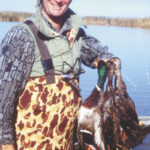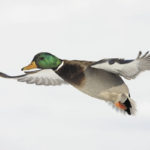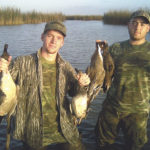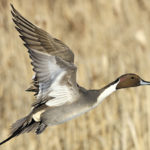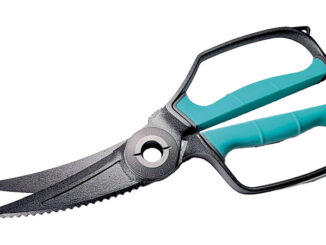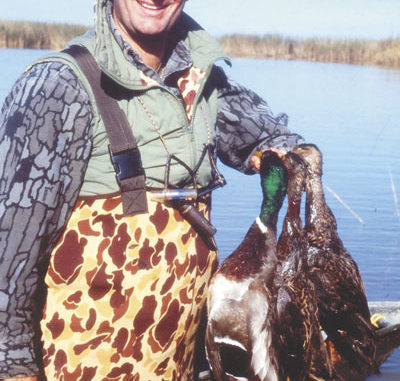
Duck food is in abundance this year, meaning coastal hunters will have to do more scouting to determine exactly where the birds are holding.
“Here they come,” rasped Pelayo.
I was already crouching low in the ’rogue, so no need for the usual frantic “get down!” bit. I simply clutched the shotgun in the “get-ready” mode.
Then I looked over at Pelayo — but oddly, he remained upright. Even crazier, he started ejecting shells from his gun!! What the …?!
I peered through our palmetto/roseau shroud, and quickly saw that what was coming were not ducks, but a boat — two boats, in fact.
“You’d really think …,” Chris snarled as he stood up from my left and started ejecting his shells, “that these clowns would have the decency to wait until after the hunt!”
“Probably feds,” Pelayo snorted. “We’re pretty close to the Delta refuge right here. Mighta known they’d show up. Our state guys are usually more courteous.”
And roar in they did, right through our decoy spread and to 10 yards of our makeshift “blind.”
“Keep cool,” I counseled as I got up. “Keep cool! It ain’t worth it!”
By which I meant that any wisecracks or snideness would only provide an excuse for them to stomp us in the manner of a Causeway cop — for the hunting-violation equivalent of a mis-clicked seatbelt, malfunctioning blinker or exceeding the speed limit by .000008 mph.
“Never heard of game agents using long-tail boats,” Pelayo frowned, as they finally idled their engines, and we got a close-up view of our visitors.
“Nope, me neither,” growled Chris.
We all looked at each other, somewhat puzzled.
“You’re on private property!” a snappily attired but very firm-spoken gent yelled from the front of the first boat.
Ah, so indeed they were not game agents.
“You got 10 minutes to pick up your decoys and get out,” snapped his buddy as he took his hand off the motor handle. “Either that, or we call the Sheriff’s Department.”
They had us flanked on both sides. The gents in the other long-tailed boat frowned, nodded menacingly, and added, “The Sheriff is our friend, so he’ll be waiting for you.”
Tom Hagen knew this scene. Remember when after Luca Brazzi’s strangle-whacking, Solazzo and the rest of Barzini’s goons surrounded Tom: “Get in the car, Tom. Go on; if I wanted to kill ya, you’d be dead already.”
“Gosh, we’re really sorry!” Pelayo said as he started rummaging in his shell bucket. “We had no idea! I hope you understand that this is a terrible mistake!”
“And on OUR part, of course!” added Chris. “We don’t mean to imply that you fellows are in ANY way culpable,” he frowned. “Just give us a few minutes, and you BETCHA, we’ll be right outta here! Maybe head over to the nearby Delta refuge. Chris was squinting, moping and biting his lip in a manner to shame the dramatically repentant Bill Clinton as he explained the Lewinsky indiscretion.
“Had we known this was private,” Pelayo added as he plucked his camera from the shell bucket, “we’d have gone over there in the first place. We sure are sorry! I hope you understand that …”
Though Pelayo didn’t manage the deluge of tears, Jimmy Swaggart’s tearful confession for his Airline motel romps couldn’t hold a candle to Pelayo’s Oscar-winning marsh-land performance of grief and contrition in the very face of our visitors/accusers.
In seconds, Pelayo was out of the ’rogue and walking through the semi-firm sand/muck (the high river had laid down some nice fresh sediment in this area) toward our visitors, already sighting in his camera.
“Listen, before we go,” Pelayo asked with a sheepish smile. “Mind if we take a couple pictures of you guys? I mean, those are some nice boats you got there.”
They all frowned and fidgeted, looked at each other a bit puzzled. The main guy snickered.
“And some nice outfits!” Chris nodded while pointing at his jacket, then at mine. “Not like our cheesy army-surplus stuff.”
Pelayo had his camera up and started snapping. But our visitors still looked a trifle suspicious.
“These pics will appear in Louisiana Sportsman,” Pelayo beamed. “We’re doing an article for them, and heck — you guys can be the cover boys!”
Now they looked confused. Then it hit — “Oh YEAH!” the head guy finally nodded “The Sportsman! Hell yeah! We ALL read it!”
He looked around to his crew who all nodded and smiled at the camera. The mood changed abruptly.
“Everybody does!” said Chris.
“Just a couple more!” said Pelayo as he crouched down near the front of the boat to take a close-up of the numbers.
“Whatta ya need THAT for?” asked Mr. Dandy.
“For the sheriff,” answered Pelayo as he snapped another, right in the guy’s face, then spun around and snapped another of the surroundings.
“For WHO?!” said his buddy from the other boat as he suddenly stood up scowling.
“Yeah, for WHO?!” snapped a suddenly frowning Mr. Dandy.
“You heard me,” Pelayo smiled. “For the sheriff!”
“And for the Wildlife and Fisheries too,” added Chris, now smiling more in the manner of the Cheshire cat. “These pics will come in very handy when we report you for violating Louisiana’s Hunter Harassment law, RS 56.”
Chris stressed the number.
“This is Plaquemines Parish Buras Levee district property. We have as much right to be here as you.”
“And you are disrupting our hunt,” Chris added, “harassing us in a clear violation of our state laws. Now we have your boat ID, and if the authorities get any complaints from the lawfully abiding citizens, it will be from US — and against YOU fine fellows. Comprende?!”
“Now if you don’t mind,” Pelayo smiled strenuously while pointing around. “The ducks are flying, and we’d like to continue hunting.”
“Plenty open land around here,” smiled Chris as he swept his arm around. “And the tide’s just coming up. So you guys knock yourselves out! But you sure as hell ain’t taking OUR spot!”
Motors suddenly rumbled.
“Man!” Chris yelled. “I had no idea these long-tail engines also had reverse!”
These models sure did — and they rumbled into mud and bubble-spewing action within seconds as our distinguished visitors high-tailed it out of our sight in the manner of an armadillo kicked from behind as he rummages in an anthill. The only thing missing was the 3-foot jump.
For going on 30 years, we’ve checked with Plaquemines Parish authorities to make sure we’re perfectly legal on this matter, and we re-check before every season to make triple-sure. So we knew we were cool — and apparently so did our (very) short-term visitors.
So with all these thousands upon thousands of acres of open, freshwater, vegetation-choked marsh all around us, and with so few hunters around, why had these fine, honest, honorable gentlemen and us both hit upon the same place to hunt?
Apparently we’d both scouted. Remember back when most of us used to hunt deer? Before piles of corn and food plots (which I unapologetically employ at every opportunity, to nail a nice spike or forkhorn, so don’t get me wrong!). Point is, there was a day — not to far back — when deer hunters would study such things as deer foods, distinguishing between primary browse and secondary browse, and on and on.
Same held for mast. We all knew that if all the oak trees in the area were “‘puttin’ out,” well, we’d hunt the white oak flats first (because the deer would also hit them first), then we might move on to the red oaks and finally late season to the willow and laurel (water) oaks, and the overcups.
Some of us follow the same “attack plan” for ducks. Last year, the Mississippi Delta from the Ostrica locks to the mouths of South and Southwest passes was choked with freshwater vegetation and, thus, duck food. Hurricanes Gustav and Ike had rendered much of the rest of coastal Louisiana barren of food-fodder, so the ducks were bunched up down in the delta.
But even with this abundance of food and the large number of ducks in the area, they tended to concentrate in certain areas at certain times of the season. And we followed them, with good results.
Two months earlier (teal season), the little sand-ridge we were hunting (near the end of Emiline Pass south of Baptiste Colette) had been thick with wild millet and peavine. Simply put: In puddle duck terms, wild millet and peavine represent the same as white oak acorns represent in deer terms. They’re both serious munchies, the munchies they’ll mostly go after first — and until they expire.
By November, the plants and pods have mostly wilted, and it’s the seeds floating in the shallows. And precisely seeds that the A-list puddle ducks mostly prefer. This explains why, as year chases year, so many more of them stay north of us in the flooded farm-fields, munching out on soybeans, corn, wheat, etc.
In Louisiana’s marshes, the closest thing we can provide to those delicacies (and western Louisiana’s rice) is wild millet and peavine, and a few others such as smartweeds.
Think of a nut bowl at Doc Fontaine’s party. The cashews always go first. Then maybe the almonds. Then the Brazil nuts. Finally the peanuts.
Actually, I use this merely as an example. Doc’s parties have no nut bowls whatsoever. We prefer meatballs, fajitas and tamales made exclusively from four-points and spikes. No tough, stinky old bucks allowed! Along with ceviche made exclusively from Spanish mackerel and bluefish — no disgusting, parasite-ridden speckled trout allowed!
So find these seed producers in the early season (while they last), and prepare for some hot puddle-duck shooting, as these matters are reckoned in Southeast Louisiana lately.
It didn’t take long after our “visitors” were well out of the way when the ducks burst upon the scene.
The first flock came in high from behind us. I was into the third note of a wretched hail call aimed at a flock a quarter mile ahead when Pelayo jabbed me with his elbow and pointed above us.
Four widgeon had cupped and were starting to bank to the left. They’d obviously seen the decoys, so I shut up with the hail, and started with the whistle. Widgeon don’t need much coaxing. Looking over, I saw that Chris’s reversible, orange/camo cap was half orange on the back.
“Hat!” I hissed. “Take it off!”
The widgeon either saw the motion or heard me. They started backpedaling furiously. In seconds, they were specks on the horizon, despite (or because of?) the racket from three calls. We spent the next few minutes in a heated “discussion” affixing blame for the fiasco.
But in minutes, Chris jerked my arm and I saw — a fairly rare sight for these parts — a pair of mallards (seed fanciers from the get-go), gliding in and almost in range.
Where’d they come from? I grabbed Pelayo’s shoulder, and pointed with my chin toward the dekes. The French ducks were on the extreme edge of the dekes, and started acting like they smelled a set-up. I elbowed Chris.
We stood and let fly just as they shot skyward. BLAAAAM! Three shots went off as both Frenchies crumpled. They splashed just outside the dekes. The drake lay motionless; the susie started kicking in those little circles but with her head under. No need for another shot. We erupted in a frenzy of whooping and high-fiving.
“That,” Pelayo yelled, “is shooting!”
Then some alarm bell must have gone off, and the teal burst upon the scene — bands of them skimming over the marsh to our left in their erratic flight. Watching them we could only marvel. Teal have to be nature’s most indecisive creatures. They buzz over the marsh in a nervous flight like they’re inspecting every pond and pothole under them. These were about 200 yards away. They’d cup and circle down over a pond, disappearing into the cordgrass and wild millet. Ah, they landed, I’d think.
Nope, there they are again. They’d spot another pond, dip down, circle twice just skimming the roseau then shoot up again. Now they were over the open water, and could probably see our decoys.
Here they come. We all saw them at the same time, and ducked.
“Get ready,” I hissed.
Our pulse rates rose as they closed the distance.
Alas, teal can actually get TOO close. Unlike big ducks who flap backwards when you rise, teal rocket straight up or over you. This means one quick shot then a wrenched neck while twisting around for the second or third, which you miss anyway. These were right on the perimeter of the dekes when we rose. Two of them landed anyway.
Blam! Blam! … Blam!
The rest were rocketing skyward.
Blam!
Chris folded the one I was following. I swung my barrel to another.
Blam!
A clean miss, shot over it. Another one was flapping furiously right over me. I swung but couldn’t swing the bead past him, so I had to twist around, put the bead right under its tail as it flapped off.
Blam!
He faltered and a few feathers flew from his tail.
Blam! Blam!
Pelayo and I shot in unison, and he folded.
Another frenzy of high fives — and the morning was young — 10:30, and the ducks were starting to pour in (usually happens this way in the Delta; ducks fly to feed as the tide comes up).
A pair of blacks (mottled ducks) appeared to our right and heading our way. Here’s another fan of seeds.
In other Southeast Louisiana marshes, we wouldn’t even bother calling or hiding. Down here, it’s different. And we all s-l-o-w-ly crouched. Chris gave a short, sharp, raspy call, which did the trick.
Their wingbeat slowed and altitude dropped — a gorgeous sight — but they weren’t coming to land. Only for a little look-see. But too late.
“NOW!”
Three shots, and both crumpled in the middle of the dekes. Within the next 20 minutes, we nailed four greys and and a big bull pintail. In the distance, we could hear some shots, probably our visitors.
Ducks kept buzzing overhead and dropping into the surrounding flooded marsh as we picked up the decoys. And here it was 12:30!
Flocks continued winging overhead as we paddled the two pirogues back to the boat, glowing from that feeling we all get after a successful hunt.
Now for some fishing.
